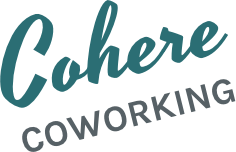It’s almost February. How are your New Year’s Resolutions faring so far? For many of us, those sweeping resolutions that inspired confidence and motivation just a few short weeks ago seem cumbersome now.

Seeking support and motivation? Book a tour of Cohere Coworking today!
Numerous resolutions have already been abandoned and many more will fall to the wayside before the end of January. If you are one of the many who are considering scrapping their New Year’s resolutions, there is another answer. You can reframe your resolution for success.
New Year’s resolutions
According to The History Channel, New Year’s resolutions have been a tradition since ancient Babylonians celebrated the start of the year in mid-March, around four thousand years ago.
Ancient Babylonians made their promises to their gods. If they were able to keep their promises to their gods throughout the year, the gods would bestow blessings on them. Modern New Year’s resolutions are more secular in nature, usually revolving around health, wellness, self-improvement, and productivity.
Why resolutions fail
Although New Year’s resolutions are diverse in nature, they often fail for many of the same reasons. New Year resolutions are frequently made on the spur of the moment and are intended to fix what we perceive as a huge overarching problem.
The goals related to New Year’s resolutions are more often than not either overly ambitious, poorly defined, or non-existent. In addition, outside accountability—when it exists—is often weak.
Reframing resolutions for success
While failing to stick to New Year’s resolutions isn’t likely to stoke the wrath of Babylonian gods, it can lead to discouragement and lowered self-esteem. Fortunately, there are many steps that can help shore up the weak points in resolutions and help you reach your goals.
Clarify your goal
Most resolutions made at the start of the year are made in service of a goal of some sort. All too often, the goal is vague or unformed. Be more productive or creative, lose weight, get healthy, improve relationships. These types of goals, while admirable, are difficult to quantify.
Defining the goal that your resolution is meant to help achieve can improve your resolve, providing motivation and purpose to the task. This means creating a goal that is meaningful to you, achievable, and measurable, then determining how your resolution can help you to achieve this goal.
Reassess your resolution
New Year’s resolutions are frequently ambitious, not taking capabilities, time, or other responsibilities into account. In addition, they are often avoidance-related rather than approach-oriented. Approach-oriented goals, such as eating more vegetables, are typically more effective than avoidance-related goals, like eating fewer sweets.
If your resolution is becoming burdensome, reassess it. Is it achievable? If not, how can you make it achievable? If adding in an extra two hours of exercise or sleep is proving to be to much of a change, try scaling it back temporarily. Add 15 minutes in February, increase it to 30 minutes in March, and so on, until you’ve achieved the time you were striving for.
Make contingency plans
With any new habit or routine, there are likely to be times when it falls to the wayside. When this happens, consider the cause, and adjust your resolution as needed. It’s important to be kind to yourself when you slip up. People are often harder on themselves than they would be on anyone else. Ask yourself what you would tell a friend or coworker in the same situation.
Enlist allies
It’s much easier to stick with resolutions if you have outside support. There are many resources to help support you as you create change in your life, whether you respond better to accountability apps, working with individuals or groups with similar goals to your own, or collaborating with communities of diverse individuals working together to motivate each other to meet differing goals.
Find friends and allies to help you meet your goals at Cohere Coworking. Book a tour today!
Penny Leigh Sebring is a Cohere member, experienced freelance writer, neophyte speculative fiction author, and gatherer of information and imaginary friends.
Photo by Diana Polekhina on Unsplash

